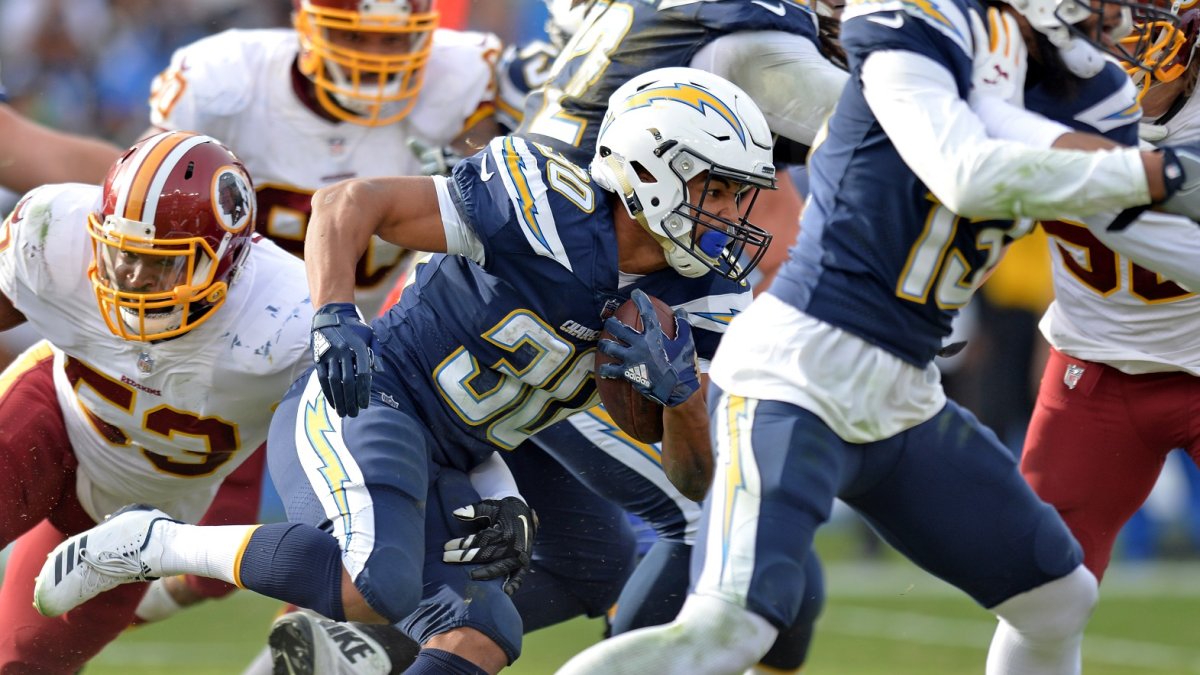Alvin Kamara’s rookie season has gotten plenty of buzz, and rightfully so. He went from third-round pick to 13th-fantasy-round barely drafted third-stringer to Offensive Rookie of the Year. His efficiency numbers were off the charts.
Austin Ekeler’s rookie season has gotten almost no buzz. He went from undrafted rookie to undrafted fantasy option to … well, he only had a handful of weeks with real fantasy relevance, but from Weeks 10-12, he was the No. 4 PPR running back, behind only two Saints (Kamara and Mark Ingram) and Le’Veon Bell. All for a guy whose Wikipedia page is exactly 100 words long.
In a piece on Kamara a couple of weeks ago, our Scott Barrett noted that among all running backs with 100-plus carries in a season since 1973, Kamara’s 2018 PPR points per touch (1.56) and yards per touch (7.73) rank first and second, respectively. Ekeler’s 2018 did not feature 100 carries (he only had 47), but had he qualified, his rates would have been 1.47 and 7.28, both third-best since 1973. (Yes, many other running backs on small samples would have qualified for the list; this isn’t to say Ekeler would have kept it up for more than double the carries. It’s just to illustrate what he did.)
Kamara in 2017 put up 2.81 yards per route run through the air and 3.8 yards after contact per attempt on the ground. He was one of 12 qualified running backs in the PFF era (since 2007) to top 2.0 and 3.0 yards, respectively, in the two metrics. Another? Austin Ekeler. They were the only two 2017 backs to make the list.
The list isn’t dotted with superstars — Correll Buckhalter, Sammy Morris, and Roy Helu make appearances (as do Dion Lewis, Darren Sproles, and Darren McFadden). And with Sproles the only player to make the list more than once, there’s an argument that Ekeler’s (and Kamara’s) efficiency from 2017 establishes a regression candidate more than it does a sleeper.
Except for one thing.
Ekeler is not in a crowded backfield. Yes, the Chargers have on their roster Branden Oliver, Kenneth Farrow, and Andre Williams (with Oliver a free agent and Williams a restricted free agent), but the main piece in front of Ekeler is, of course, Melvin Gordon. Gordon had been a fine fantasy option the last two years (after a near-disastrous rookie campaign in 2015), but that’s been mostly on the legs of volume — he hasn’t had better than 4.0 yards per carry in any season (career 3.8). Pick an efficiency stat, and Ekeler topped Gordon in it in 2017.
What does it mean for 2018? Even if he’s been inefficient for his career, Gordon is more of a ball-carrier than Ekeler. But the Chargers’ goal in 2015 and 2016 was a two-headed monster, with Gordon and Danny Woodhead splitting the job more or less how you’d expect those to players to divvy up a workload. With Woodhead gone and Ekeler fresh-faced, Gordon had to shoulder basically the entire workload for 2017, but don’t expect that to continue.
Ekeler came out of nowhere in 2017, but he has the statistical profile of guys (like Kamara, Sproles, and Helu) who have had success as change-of-pace, third-down backs with more upside than that. He even has the size profile (at 5-foot-9, 200 pounds) of those types. Even as a rookie who didn’t start out with much of a role in 2017, Ekeler had a few weeks of fantasy relevance. A year under his belt, with impressive efficiency numbers, and an inefficient back in front of him? He could easily be the next generation of Darren Sproles in 2018, and that would make him a deep-league flex with serious upside.



 © 2025 PFF - all rights reserved.
© 2025 PFF - all rights reserved.